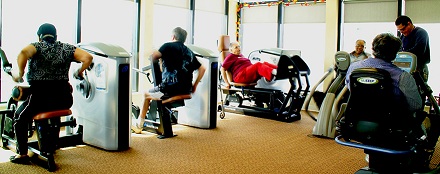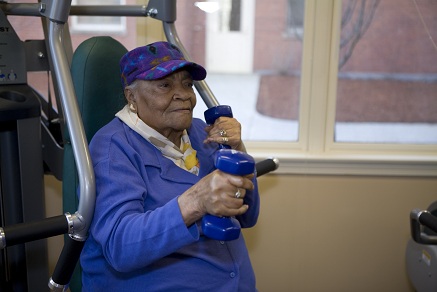As men and women get older, regular activities like walking, climbing stairs, bending and reaching, get a lot harder and the risk of falls increases. These “activities of daily living” require strength and balance, and that’s just one of the reasons why fitness programs for older adults are so important.

Fitness First participants use the Nautilus machines
Regular physical activity can also help older adults maintain or improve their health so they can enjoy greater independence and a higher quality of life.
“Falls are a huge problem for older adults who aren’t doing regular physical exercise to maintain their muscle mass,” said Sheila Place, director of programs for Rogerson Communities. “By participating in regular, tailored exercises, older adults build strength and stamina, improve their mobility and increase their capacity for basic activities, a key component to independent living.”
For nearly a decade, Rogerson Communities has offered its Rogerson Fitness First program at no cost to older adults who participate in its adult day health centers or live in Rogerson’s low-income senior housing.
Fitness First now serves approximately 250 older adult men and women each year in five locations including sites in Roslindale, Roxbury and Jamaica Plain. The program includes two 30-minute fitness sessions each week using five Nautilus machines designed for older adults and administered by trained specialists. The focus is on strengthening, mobility, balance and flexibility exercises, but program participants use the NuStep elliptical machine or a treadmill to build cardio endurance as well.
The majority of participants don’t have any experience going to a gym, but, according to Place, more and more seniors are open to trying it now that health and fitness has become a greater focus for people of all ages.
One participant, an 83-year-old woman, has seen her strength increase by 50 percent and her cardio ability increase 200 percent since she joined the program 18 months ago. “I warm up with the exercise bike, and then I work out three reps of 10 on all the other machines three days a week,” she said. “I now feel much stronger and a lot healthier. I also enjoy cooking for my family and babysitting the grandkids, without anyone worrying about my health or falling down. My children see a big difference in me.”
Rogerson assesses each participant’s progress at the end of 12 weeks and then again annually on factors such as balance, physical ability and stamina. Fitness specialists encourage participants to continue as much as they want.
“With each participant, we start by talking about their health status and goals. Then, once we have physician approval, we carefully tailor activities to meet the specific needs and abilities of participants,” explained Place. “Some folks come in with their walker, or using a cane. It doesn’t matter. We get everyone on the machines.”
“We had one gentleman who had worked all his life in Boston, but his family lived down south,” continued Place. “After he had a stroke and recovered from rehab, he was all alone in his apartment and it was easy to feel isolated and depressed. One of his friends encouraged him to visit our adult day health center where he joined the Fitness First program. Now, he walks with a cane, has pushed himself to climb stairs when necessary and is one of our biggest advocates.”
Twelve-week evaluations of older adults participating in Fitness First at one location reinforce the progress participants have made in their overall health. Evaluations revealed a 159 percent increase in lower back strength and a 99 percent increase in leg strength.
“These improvements have a direct, everyday impact on elders’ lives,” said Place. “Increased leg strength allows older adults to stand up out of a chair and improved lower back muscles enable participants to walk straighter and improve their sense of balance, avoid back pain and step in and out of bed without assistance.”
“Rogerson Fitness First demonstrates, time and again, that strength training for older adults changes lives,” said Anne Morton Smith, vice president, development and community relations for Rogerson Communities. “Strength training not only enhances health and independence, but also keeps elders connected and helps them feel good about themselves and the world around them.”
Place agrees that social connectivity is an important benefit. “Our program has become a social mecca,” said Place. “The men talk about the news or the Red Sox as they exercise and we have several women who have become workout buddies, coaching each other along the way. The participants’ dedication and determination is inspiring to all of us. They feel stronger, healthier and happier as a result. It’s amazing to see.”
This story was published originally in the Tufts Health Plan Foundation’s May 1, 2013 newsletter.


